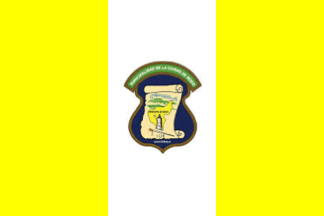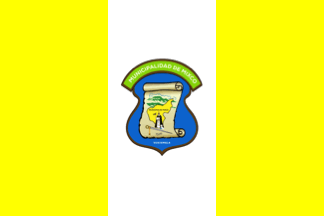 image by Ivan Sache, 24 January 2021
image by Ivan Sache, 24 January 2021
Last modified: 2021-02-20 by rob raeside
Keywords: mixco |
Links: FOTW homepage |
search |
disclaimer and copyright |
write us |
mirrors
 image by Ivan Sache, 24 January 2021
image by Ivan Sache, 24 January 2021
See also:
The municipality of Mixco (507,549 inhabitants in 2020; 13,200 ha) is located
20 km west of Guatemala City. Mixco is the country's 3rd most populated
municipality; its population represents 10% of the whole population of Guatemala
City Metropolitan Area.
Ivan Sache, 24 January 2021
The flag of Mixco is vertically divided yellow-white-yellow with the
municipal coat of arms in the center.
Photos
http://centranews.com.gt/politica/1601-alcalde-de-mixco-le-reclama-a-giammattei
https://www.elhitgt.com/2020/05/neto-bran-revela-cifras-de-covid-19-en.html
https://emisorasunidas.com/2020/07/29/neto-bran-suspende-servicio-de-transporte
https://www.facebook.com/Noti7/posts/2500915579931151
https://lahora.gt/alcalde-neto-bran-confirma-89-casos-de-covid-19-en-mixco
https://www.prensalibre.com/ciudades/guatemala-ciudades/mixco-contara-con-camaras-de-reconocimiento-facial-para-tratar-de-combatir-la-delincuencia
https://www.publinews.gt/gt/espectaculos/2016/09/15/neto-bran-le-entrega-llave-ciudad-mixco-gaby-asturias.html
https://www.scoopnest.com/es/user/NuestroDiario/872128815488749569-alcalde-de-mixco-neto-bran-da-detalles-del-atentado-en-contra-de-la-municipalidad-de-mixco
Videos
https://www.facebook.com/watch/live/?v=630092994186695
https://www.youtube.com/watch?v=9XkPA2JaFMc
 image by Ivan Sache, 24 January 2021
image by Ivan Sache, 24 January 2021
The flag is used with two slightly different versions of the coat of arms,
differing by color shades and minor graphic details.
Ivan Sache, 24 January 2021
mi.gif) image contributed by Fred Drews, 13 October 2011
image contributed by Fred Drews, 13 October 2011
The coat of arms is inscribed in base with year "1526", the date of
foundation of the town by the Spanish conquistador Pedro de Alvarado
(1485-1541).
The shield features a map of the municipality of Mixco and St.
Dominic standing in front of it, recalling that Mixco was once ruled by the
Order of St. Dominic. In Guatemala, the Order established "doctrines", which
were administrative divisions nominally subordinated to the parishes ran by the
secular clergy. The "doctrines" were indeed fully independent, allowing the
Order to keep control on the local economical resources. They did not obey
either to the Spanish crown or its local representatives. Charles III reformed
in 1754 the colonial administration, ordering the transfer of religious
jurisdictions exerted by the orders to the secular clergy.
Ivan Sache, 24 January 2021